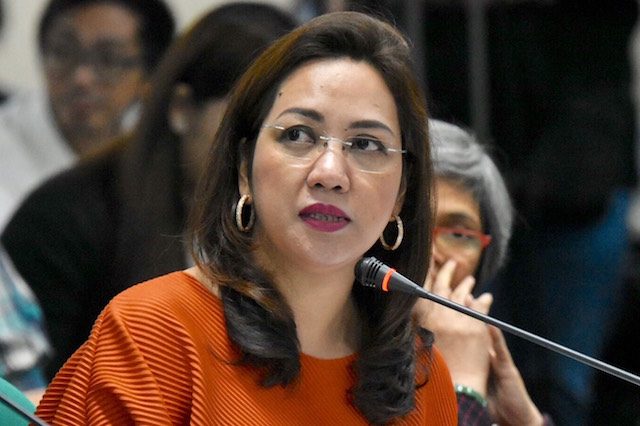SUMMARY
This is AI generated summarization, which may have errors. For context, always refer to the full article.

MANILA, Philippines – Former health chief and now Iloilo 1st district Representative Janette Garin insists that the use of Dengvaxia can be a “preventive measure” against impending dengue outbreaks.
In a statement released Wednesday, August 7, Garin said the “dengue vaccine can’t address the current outbreak but can prevent future outbreaks.”
“I agree with [health undersecretary Eric] Domingo that the dengue vaccine is not a response to the ongoing epidemic but I believe it is wrong to say that it will have no effect,” Garin added.
The Department of Health (DOH) on Tuesday, August 6, declared a national dengue epidemic as cases of the mosquito-borne disease continued to rise nationwide. Earlier that day, in an interview with ANC’s Matters of Fact, Domingo said that Dengvaxia “is not an epidemic response vaccine.”
On statements that the ban on the vaccine led to dengue outbreaks around the country, Domingo said: “I don’t think that’s accurate. We have outbreaks in countries where dengvaxia is a registered product because nobody uses it as a mass immunization product. It’s not like measles or polio [vaccines] that we can give to everyone.”
The dengue vaccine is listed in the World Health Organization’s (WHO) Essential Medicines List as a recommended vaccine for “some high-risk populations.”
Domingo said that the age group most vulnerable to dengue are 5 to 9 year-olds, and that the vaccine can only be given to children who are 10 to 16 years old.
“If we make it available now, we can only give it to children who, for example, had dengue last year, or children who have it now and when they get better you give it. But you cannot give it to the general public to protect them because you need to have a test to show that they’ve had dengue before,” added Domingo.
But Garin stood by her call for the health department to “put aside biases from the anti-vaxxers.” She had already said on July 31 that she wanted Dengvaxia to be made available in the local market.
“People are dying, the virus is spreading. Implementation doesn’t have to be mass immunization. If they (DOH) don’t want to give it to the poor, they can at least make it available to private doctors and individuals who are willing to shoulder the cost. That way it lessens the number of vulnerable dengue victims” she added. (READ: Lift ban on dengvaxia, doctors’ group urges DOH)
This debate comes in the shadow of the Dengvaxia scandal, which started when Sanofi Pasteur, the vaccine’s manufacturer, said in November 2017 that its Dengvaxia dengue vaccine could pose risks to people who have not been previously infected by the virus.
After Sanofi’s announcement, health secretary Francisco Duque III suspended the dengue vaccination program, which was implemented by Garin and then-president Benigno Aquino III.
By then, the program had administed the vaccine to over 830,000 students in the National Capital Region, Central Luzon and Calabarzon. (TIMELINE: Dengue immunization program for public school students)
Dengvaxia was permanently banned in the country in February 2019 as Sanofi was found by the Food and Drug Administration (FDA) to have shown “complete disregard of government rules and regulations.” Sanofi has since filed an appeal with the DOH to lift the ban. The DOH said it is still in the process of assessing the appeal. – Rappler.com
Add a comment
How does this make you feel?
There are no comments yet. Add your comment to start the conversation.